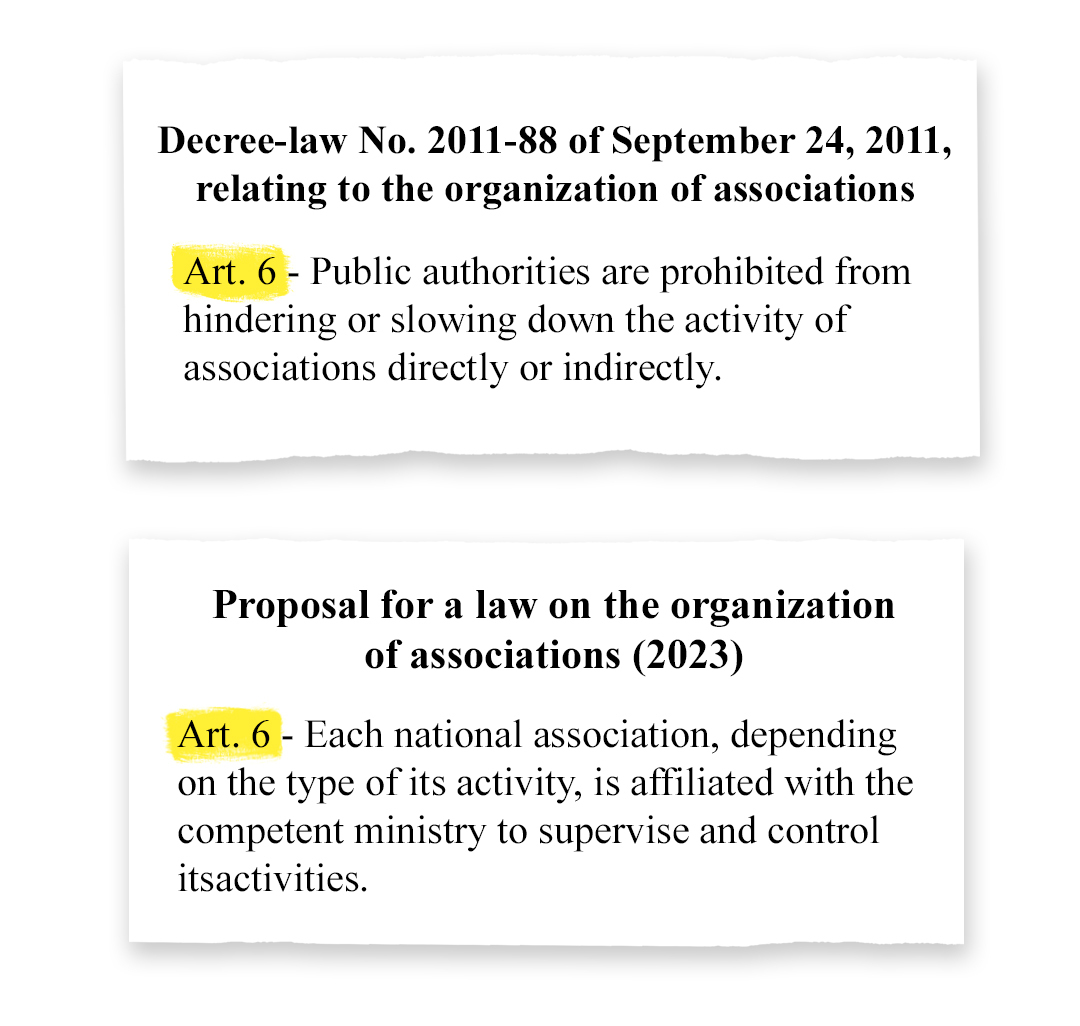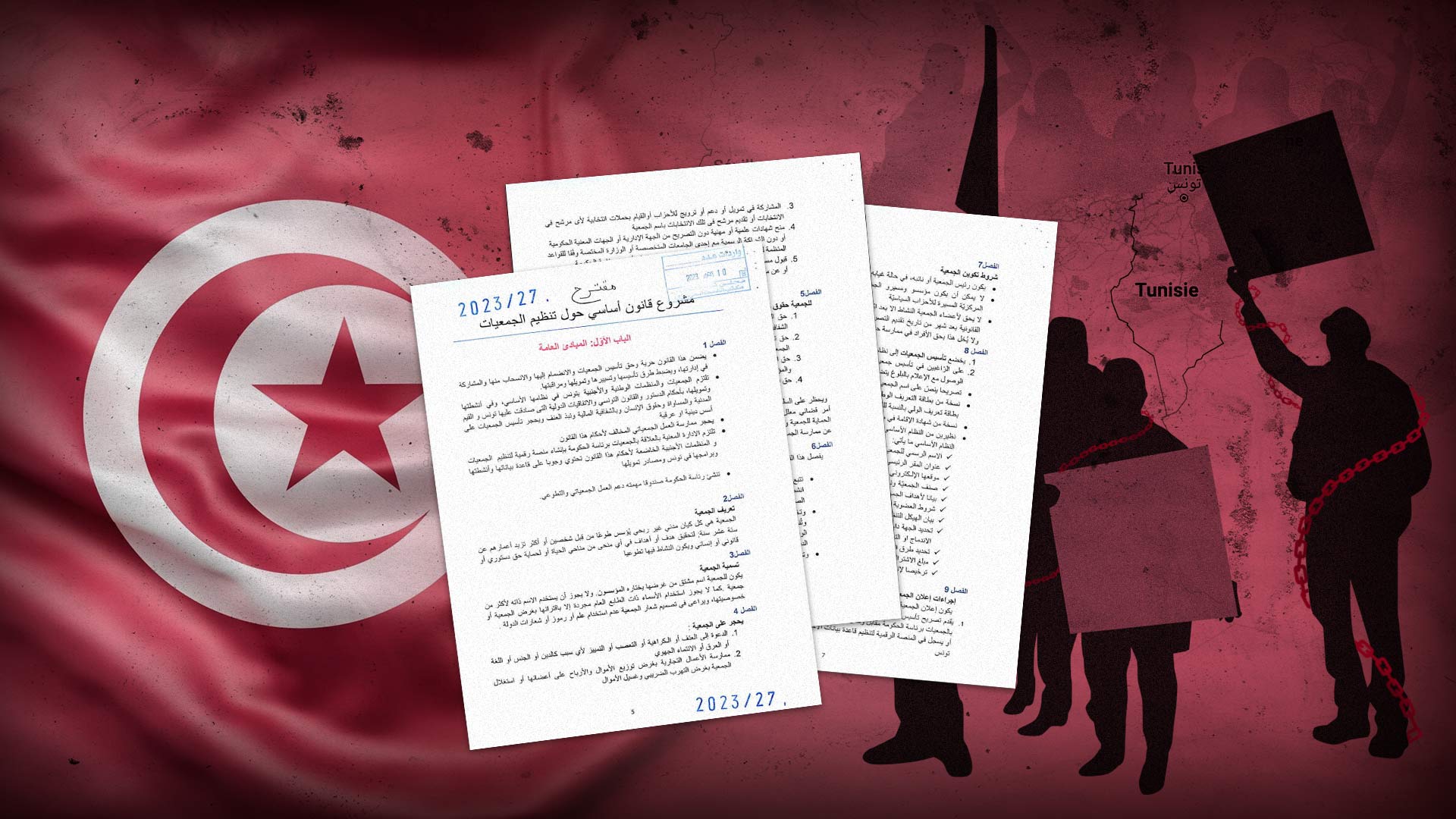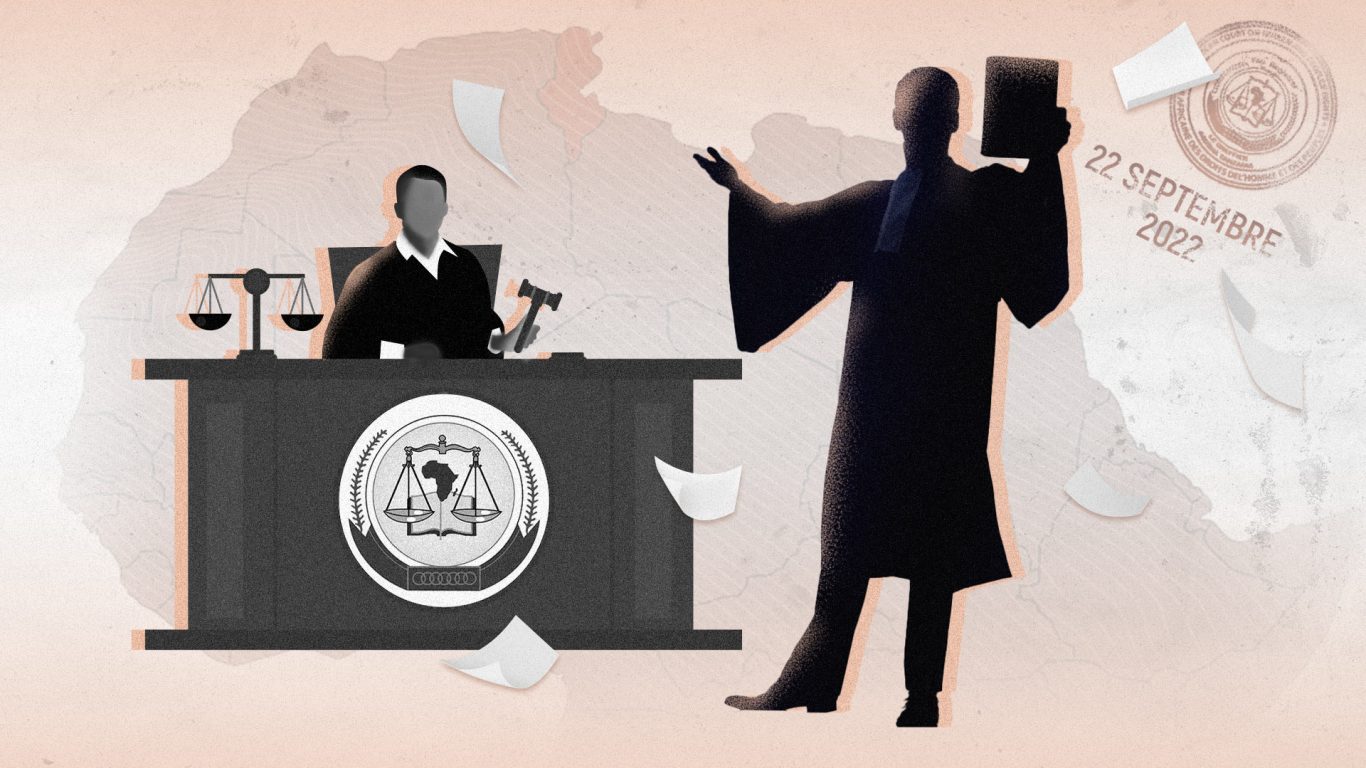Put forward by a group of members of parliament, a bill designed to regulate the organization of associations seems to jeopardize the freedom of civil society instead. Combining discretionary powers, restricted access to resources and threats of dissolution, the law has raised concerns among associations, which have already been targeted by the President of the Republic and the Head of Government.
Prime Minister Ahmed Hachani announced on Monday December 11 that a commission had been set up to work on a new draft law on associations, "and possibly to consider revising other laws relating to the funding of associations and money laundering". The Government Office also stressed, in a statement, the need for this new law to contribute to "strengthening the role of civil society, while respecting the principles, rights and safeguards set out in the Constitution, within the framework of the rule of law."
Fundamental changes
"An association that I won't name has received 7 million dinars from foreign sources since 2016, allegedly on behalf of civil society. These associations are mere extensions of foreign intelligence services. We need to cleanse the country and put an end to this situation," denounced President Kais Saied during a meeting with the Minister of Justice on December 7, 2023. Barely two weeks earlier, on November 24, he had already accused another association - also without naming it - of receiving billions of dinars.
The proposed organic law n°027/2023 on the organization of associations has found fertile ground in this toxic political climate. According to Lamine Benghazi, this bill is being introduced against a backdrop of "the seizure of all powers since July 25, 2021, the erosion of the very foundations of the rule of law, of checks and balances and intermediary bodies, attacks on the independence of the judiciary, the restriction of freedoms, and the demonization of associations, even from the Head of State, no less".
The proposal was put forward by a group of ten independent parliamentarians. Fatma Mseddi is one of them. On September 7, 2023, she used Facebook to post a brief summary of the contents of the proposal, "which we will shortly be presenting in order to turn it into law". Submitted to the Committee on Rights and Freedoms a few months later, the official document faithfully reproduces the points mentioned in the Facebook post.
Fatma Mseddi did not reply to inkyfada's emails requesting an interview, but she has already made statements in the media to defend her proposal.
"Associations are exerting pressure to prevent the bill from passing. I'm talking about associations like Amnesty International, or the Tunisian Association of Democratic Women (ATFD). They're feeling the pressure of the foreign funding tap being turned off. The money these associations receive is a threat to Tunisian democracy", she declared on Attessia TV on October 30.
The proposed law, which is being reviewed by the Committee on Rights and Freedoms, deviates substantially from the existing legal framework, namely Decree no. 88 of 2011 governing the organization of associations in Tunisia.
Article 6 of the 2011 law provided that "public authorities may not impede or hamper associations' activities, whether directly or indirectly". The new bill suggests almost the opposite, with an article stating that the activities of associations shall be supervised and monitored by the Ministry with which the association is affiliated.


Comparison of article 6 of the law on associations as presented in Decree 88 of 2011 and the new bill.
"Why should associations be affiliated to ministries?" wondered Oumayma Mehdi, representative of the Tunisian Forum for Economic and Social Rights (FTDES). "This decree stipulates that [...] it will be up to the Ministries to determine whether the nature of the activities carried out by associations meets the 'conditions', without any clear guidelines or set of rules other than the Ministry's own judgment."
The text also places particular emphasis on monitoring associations that receive foreign funding, whether they are national associations or foreign organizations operating on Tunisian territory. All foreign funding would require government approval, under the new bill.
"But the fact that the government is unwilling to disclose its criteria suggests that this so-called 'approval' is essentially political. After all, foreign funding is only a method, not a result", says Oumayma Mehdi.
She believes that if the criteria were technical, they should have been clearly laid down in the law, so that all associations could follow them.
Another provision of the law prohibits the solicitation of funds from countries that have no diplomatic relations with Tunisia, or from other entities that defend the interests of such countries. A seemingly unnecessary measure, given the precautions already in place. "Funding must go through the Central Bank anyway, which means that any suspicious foreign funding would certainly be monitored and reported," she noted.
In addition to being regulated by Decree-Law 88, associations are also subject to the law on combating terrorism and money laundering. Samia Charfi, Director of the Office of the Head of Government, announced on November 20 the launch of legal proceedings to dissolve 176 associations for financial offenses. So far, 69 of these have been dissolved, while the dissolution requests of the remaining 57 have been rejected.
Aside from tax reasons, the proposed law specifically focuses on foreign funding. According to activists, this is a "leading" argument that foreign funding exploits and supports terrorism and foreign political intervention.
"Surveys have revealed that only 4 out of 19 000 associations have been dissolved due to suspected links with terrorism. So foreign funding is just an excuse, like using the 'terrorism' argument to spread fear among the masses and restrict the activities of associations," says Oumayma Mehdi.
For Amine Kharrat, Senior Analyst at Al Bawsala, these judicial decisions, made using the legal arsenal in force, are proof, if any were needed, that the proposed law "is ridiculous".
"This matter clearly proves that the mechanisms for monitoring and sanctioning associations, in the event of embezzlement or money laundering, are all in place, to do so within the existing legal framework", he believes.
Tunisian activists' warnings are echoed by international organizations working in the country. The latter fear that the proposed law may constitute a violation of the fundamental rights that associations consider essential to their proper functioning.
As a matter of fact, several organizations signed an open letter on November 7, calling for the rejection of the bill which, they believe, would " dismantle civil society" .
Echoes of a former dictatorship
Critical discussions about the bill within associative circles go beyond legal analysis, and point to several parallels between this text and the way associations and civil society were managed under the dictatorial regime of Zine el-Abidine Ben Ali.
Back then, the regime sought to restrict civil society's activities to charity and donations, and each structure was required to declare its field of activity. "As if an association was limited to working on a single issue", said Oumayma Mehdi mockingly. The legislation in place at the time allowed, among other things, the infiltration of associations as a means of silencing dissent.
The Tunisian Human Rights League (LTDH) is a case in point as it was classified as an association of a general nature at the time, so that members of the ruling Democratic Constitutional Rally party (RCD) could infiltrate it, explained Nessryne Jelalia, a member of Al Bawsala's Executive Board.
The proposed classification system as well as affiliating associations to a supervisory Ministry is reminiscent of these control methods, paving the way for administrative discretion the activist added.
"Affiliating associations to Ministries calls into question the fundamental independence of civil society, which should be free to criticize and organize without any Government interference," she contends.
According to Jelalia, a restrictive pattern has persisted in the Tunisian political landscape since the Ben Ali era all the way to the present day, even if it was marked by a "brief period of relative freedom during the Troika's revolutionary euphoria".
As it happens, neither Kais Saied nor Fatma Mseddi would be the first to try to restrict freedom of association and civic space. Mehdi Ben Gharbia, Minister for Relations with Constitutional Institutions and Civil Society in Youssef Chahed's Government at the time, had already ventured down this path in 2016. The current bill, which "has been in the making since the era of Ben Gharbia and Chahed", seems to follow in his footsteps, relentlessly looking for loopholes to restrict associative freedom, often using terrorism as a pretext, Jelalia explained.
Aside from the striking similarities with the dictatorial period in Tunisia, several activists and analysts have warned that this bill is also reminiscent of more authoritarian regimes in the region, such as in Egypt and Jordan. "The proposed law is very similar to the one adopted by Egypt's authoritarian regime, which is designed to considerably restrict the work of associations," argued Hafidha Chekir, retired university professor of public law, feminist activist and Vice-President of the International Federation for Human Rights.
"Any authoritarian regime will try to attack civil society and associations," confirms Amine Kharrat. "So I think it's safe to say that we're heading in the same direction as Egypt with Sissi. Or even Russia or Jordan."
A much wider impact
"If associations were to cease operations overnight, there would no longer be any school buses to pick up children, and neighborhoods would no longer be cleaned on a regular basis. We really need to raise public awareness of this cause, and fast!"
During a discussion on the proposed law at a consortium on human rights and inclusion held on December 5, a participant's plea garnered unanimous agreement in the room: access to health care, shelters for women victims of violence, access to justice... Many of the facilities and services available to citizens across the country are provided or supported by associative projects or civil society.
"We provide legal aid services to thousands of people at ASF, and have been doing so for years. What will become of all these people, tomorrow, if they no longer have support from civil society, which, let's not forget, makes up for the State's failings, on so many levels?" said Lamine.
When a civil society initiative such as the center for women victims of violence in Tataouine was implemented by the Ministry of Women's Affairs in 2022, State representatives barely visited the new structure, according to Nessryne Jelalia.
"This situation has forced the Ministry to enlist the help of a Zarzis-based organization to provide training for the staff assigned to the center. [...] It would appear that the State is delegating some of these responsibilities to civil society, a burden that the Ministry itself seems reluctant to assume", she points out.
Is the state also oblivious to the role that associations and civil society play as employers? There are no exact figures on the number of people working for civil society structures, but the employment factor should presumably hold considerable significance in this context.
The State manages a number of employment incentive mechanisms, while paradoxically receiving support from associations or foreign funds. The civil service contract, for instance, which can be established with associations, is one of these active employment policy mechanisms at State level.
"Aneti* figures indicate that over 168 000 contracts of this type were signed between 2011 and 2019, so if we de facto prohibit salaried employment within associations, as suggested in Article 2 of the bill, it would considerably undermine the seriousness of this proposal," comments Amine Kharrat.
Another example is the fight against HIV and AIDS, where the Ministry "avoids acknowledging realities such as drug use, sexual relations between men, problems specific to men and women, and sexual practices in prisons", said Jelalia.
The civil society is therefore responsible for carrying out actions such as needle exchange, prevention and condom distribution. However, when the Ministry's coordination fails to meet expectations, "the Ministry of the Interior proceeds with summary arrests of volunteers. Yet, the same Ministry also requests funding from the Global Fund to Fight AIDS to cover the salaries of its staff", she revealed.
"This attitude is indicative of a certain hypocrisy on the Government's part, which only shows its support for civil society when it serves its own interests."
Defenders of the freedom of associations raise an alternative argument, namely that of the economy: "Civil society pays its taxes, so there's also an impact on the State coffers, but also on foreign exchange earnings given the country's desperate shortage of foreign currency", Benghazi asserted.
It would appear that, currently, the main problem for the Government is the strong involvement of associations in the socio-political scene. "Even small local associations that defy their municipalities and speak on behalf of ordinary citizens are perceived as a form of opposition to authority" said Oumayma Mehdi.
"When talking about foreign funds, they don't say that they were used to build the sports hall in your neighborhood, they say that they come from foreign intelligence services, that they are allocated to serve a particular agenda... The whole thing is a discourse of conspiracy and populism, with ramifications extending well beyond civil society," Amine Kharrat retorts.
Activist Hafidha Chekir believes that international mechanisms and protocols can be a means of countering the erosion of freedom for civil society and associations: “Tunisia has faced condemnation from the African Court, as we've witnessed. As a nation signatory to international charters and protocols, we should not hesitate to seek redress to these bodies.”
In 2012, the UN Special Rapporteur on the Rights to Freedom of Peaceful Assembly and of Association recommended a “declaratory system” rather than "prior authorization" for the creation of associations, thus eliminating the need for approval from the authorities.
On the same subject
Associations and civil society representatives are virtually unanimous: it is essential to defend against the threats to the independence of associations, and prepare to resist and reject the "populist" arguments used by the authorities, especially when it comes to foreign funding.
For Amine Kharrat, however, the threat posed by the proposed law doesn't seem so imminent: "I think the State has other priorities, such as discussing the 2024 Finance Law or the law on the independence of the Central Bank. These two topics may well be prerequisites for approval of the law on associations, considering how these issues are interconnected."
Although the bill presents a threat, and positions have been expressed at the highest levels of the State, it seems highly unlikely that the Presidency will approve any significant changes, as was the case during discussions on a bill concerning the criminalization of normalization with Israel. This parliament doesn't really have the power of autonomy, even on issues that fall within the same rhetoric as the State’s, said the analyst.





